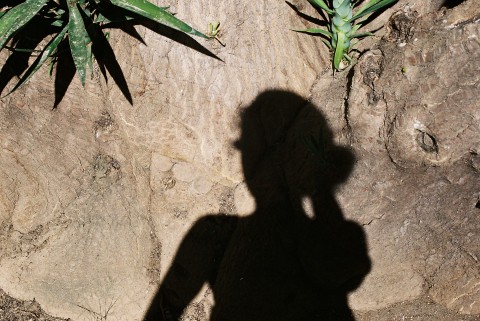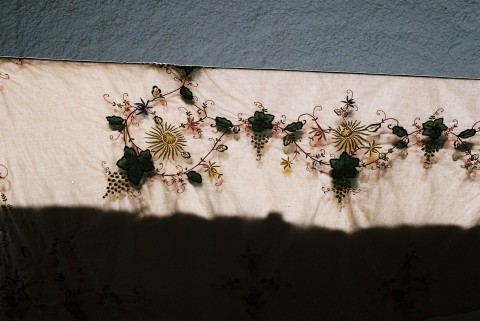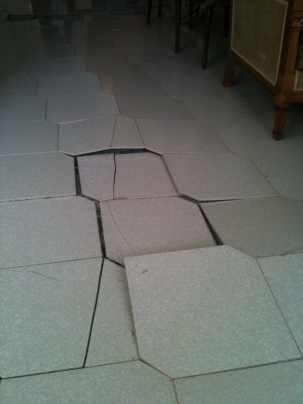For A.
August 24, 2014 § 5 Comments

Aug14-AE1-F3
I find myself less willing to write in English. A sign of sudden dislike? No, more a sign of some sort of language fatigue. I think mostly in Greek or German. I should say, I mostly think in a mixture of Greek *and* German. For me, writing in English, putting thoughts into English sentences or verses, isn’t just challenging though satisfying work; it’s also a kind of a clearing of my thought cloud — a way to put emotional distance between my thoughts and their sources while still expressing them.
Nevertheless, two weeks into my holiday month here in Greece, I still feel tired and worn out from work and other challenges I faced before vacation began. I find myself distracted and lost in those thought clouds. And once again, Greece is primarily a bodily experience for me; the mind is taking some days off. I enjoy the dawns and dusks, the sea, the salt on my skin after a long swim, the taste of each tiny piece of bread that I dip into olive oil….
But things happen, too, and sometimes they are less enjoyable. August 15, was a high Orthodox feast day for the Assumption of the Virgin Mary. Since half of the Greek population is somehow named after Holy Mary, there was someone celebrating a name day in nearly every household. In ours, it was my dad and I. My best friends were invited to dinner and Mum gave it her all to demonstrate what I’ve been missing the whole year: fresh salads and lamb, stuffed grape leaves, my favourite pie with feta cheese, herbs and spinach…. Wine!
All day long the phone kept ringing with people congratulating us for our name day. Around midday, A. called from Crete. A. is an Albanian woman who had worked in my family’s grape fields since first coming to Greece in 1992, more than 20 years ago now. I had already begun my studies in Germany then, but I was spending almost all of my long term breaks and summer vacations back in my village. Everyone was very curious about the life A. had left behind in Albania, so when work was finished, we’d all have lunch on the veranda and ask her questions.
A. was one of the minority Greeks who’d suffered discrimination during the Albanian Communist dictatorship. She spoke perfect Greek, having been taught by her mother, and in Greek schools when they existed. Her husband, who followed her to Greece a few years later, was a Muslim Albanian who’d learned a bit of Greek after working here for a few years. He changed his Muslim name from S. to “George” immediately after coming: He wasn’t counting much on the religious tolerance of most Greeks, and besides, people (like my dad) kept forgetting his Muslim name. Albanians are wise people. Greeks are equally wise when elsewhere, and equally intolerant as others when they are home.
Because she spoke Greek, A. was one of the first of the Albanian immigrants. She walked the entire way down to the Peloponnese with her seven-year-old son, the only one of her four children who she felt was too young to be left behind with their father, two older daughters and a second son. (A. was the inspiration for my short story, “St George’s Bell”.)

Aug14-AE1-F3
My family was one of the lucky ones who profited from A.’s determination to make enough money in Greece in order to build a huge, brand new house for her family back in Albania. (I’ve seen photos of it, and it makes my parent’s house look quite shabby in comparison.) She, a slim and positive-spirited woman, took every job she could find in the fields and in the houses: picking fruit, cleaning, and even digging in the fields. Everyone praised her diligence, as well as her intelligence when problems needed to be solved. While living in our village, she didn’t rent a proper house as others did because she wanted to save as much money as she could for her family’s dream. Instead, she lived in the fields in a shack that was offered to her by another local farmer. However, when my son was baptised in Greece, she was the one who gave him the most expensive present. That really brought tears to my eyes.
I’ve always felt there was a special bond between A. and me because we became immigrants at almost the same time, and we loved exchanging stories about our lives. She experienced firsthand the whole development of the immigration movement to Greece during the past twenty years, and its relation to the Greek financial crisis: the first overwhelming wave of immigrants from ex-Communist countries after the political earthquakes and Balkan wars; then, the settling down of things after the immigrants became legal and their prospects in Greek society improved; and finally, the second huge wave of immigration during the financial crisis, when refugees crossed the Turkish borders and the Mediterranean Sea. This financial crisis affected immigrants like A. as much as it did Greek citizens and sparked the rise of xenophobia and neo-Nazism. (It’s important to mention here — and further proof of the unpleasant similarities among human beings — that even some immigrants of Albanian origin have been active in racist attacks on immigrants of colour.)
Now, A. has been living in Crete for two years, ever since she was diagnosed with colon cancer. She moved there with her husband so she could be cared for by her two married sons who work and live in Crete with their families. She has been undergoing chemotherapy and other treatment at a local hospital.
I was very moved by her phone call but sad to hear her say how tired she was. After we talked, my mum, who’s been in regular contact with A., informed me that her health was in a very bad state and that the end had been postponed as far as an end could be postponed.
But I was not the only one who was moved that day! While mum, a very dear cousin of ours, and I were preparing the dinner table for our expected fourteen guests on the veranda, bringing out the china from our “good” living room, we heard a terrible noise that sounded like cracking, falling stones. I thought the roof tiles were dropping down into the living room because of an earthquake, which I’ve experienced before, so I shouted to my son: “Get out of the house!”
Mum, my cousin, and I quickly looked around, but nothing was falling. Then we realized that the floor was moving. Its large white tiles were rising and breaking in domino effect and in several directions, as if huge tree roots were pushing them upward from below. No need to mention all the horror movies we’ve watched were influencing our assumptions about what might be trying to come up through the middle of our house!
One architect and two construction engineers later that evening, we found out it was something that often happens when tiles are not properly laid with enough glue and space between them: After two decades, the natural laws of physics had caused them to expand and contract. Now, four connected rooms looked as if we’d had a private earthquake, and the cost of their repair was an impressive name day present for my dad.
Nevertheless, this explanation was a great relief, and after we’d all calmed down, mum saw no reason to cancel the dinner: the food had been cooked, the wine was cold, and the china was now safe on the veranda table. Plus, The spectacular calamity could be reported and shown to our guests as an opener. It was an evening of great oohs and aahs, along with plenty of laughter.
The next morning, we were still talking about the events when a neighbour brought us the news: A. had died the evening before. Our tiles had been laid in 1992, the same year that A. had come to our village on foot, signed on to work for my family, picked our grapes, and swept our newly-tiled floors.
A.’s family took her body back to Albania, where funeral rites were performed in her beautiful house.

I always enjoy your posts. This one particularly touched me in a strange way. It was disturbing, but not unexpected, to learn of the kind and quality of racism in your homeland. I’ve traveled extensively but not in your part of the world
. My observation as a black American in his mid eighties is that wherever there are people of color there are people with biases. All that not withstanding, thank you for the post.
LikeLike
Dear Edgar, thank you so much for your kind comment! I’m so happy you enjoy my posts and it’s a pleasure every time I “see” you here. I’m back in Germany, and soon back to teaching, but I hope to write one more travelogue and reflections on my trip to Greece as soon as workload permits. In the meantime, I’ll post some photos on my Flickr account (to visit, you can click on the photography link on the left) and tweet short thoughts or verses.
Re: Racism. I, too, think there’s a long way we have to go in order to fully overcome centuries of colonisation history which have equally, but in different ways, traumatised perpetrators and victims and have deeply, even unconsciously, influenced our perception of the ‘other’ race. (Teju Cole wrote a very soulful and essential relevant essay I warmly recommend if you haven’t already read it: http://www.newyorker.com/books/page-turner/black-body-re-reading-james-baldwins-stranger-village)
Sometimes this reality makes me impatient and very sad. Greece is no better or worse than other places, though it *is* in a bad shape at the moment.
LikeLike
Let the architects and construction engineers have their theories, but from the looks of those tiles, I’d say there’s something trying to come up through the middle of your house. o_o
LikeLike
You’ve watched too many American movies, too…
Thank you for your edditing support on this post, Dear M. xo
LikeLike
Reblogged this on jetude and commented:
.beautiful
LikeLike